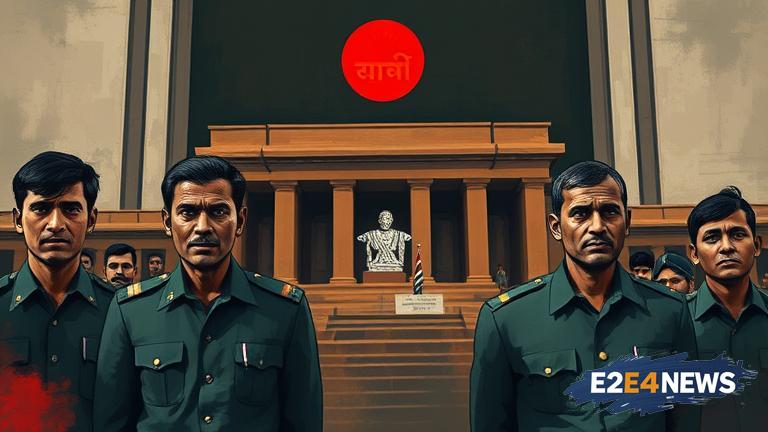The Bangladesh Supreme Court has delivered a landmark verdict, upholding the death penalty for two convicted war criminals, ATM Azharul Islam and Abdul Jalil. The court’s decision has been met with a mix of reactions, with some hailing it as a victory for justice and others expressing concerns about the fairness of the trial. The two men were convicted of committing atrocities during the 1971 Bangladesh Liberation War, including murder, rape, and torture. The verdict is a significant development in Bangladesh’s ongoing efforts to bring to justice those responsible for war crimes committed during the country’s struggle for independence. The trial was conducted by the International Crimes Tribunal, a domestic court established by the Bangladesh government to prosecute war crimes. The tribunal found the two men guilty of multiple charges, including murder, rape, and torture, and sentenced them to death. The defendants appealed the verdict, but the Supreme Court has now upheld the death penalty. The court’s decision is likely to be welcomed by many in Bangladesh, who have been calling for justice for the victims of the 1971 war. However, human rights groups have expressed concerns about the fairness of the trial, citing allegations of torture and coercion of witnesses. The groups have also raised concerns about the use of the death penalty, which they argue is a violation of human rights. The Bangladesh government has defended the trial, saying that it was conducted in accordance with international standards and that the defendants were given a fair hearing. The government has also argued that the death penalty is necessary to deter future war crimes and to provide justice for the victims. The verdict is a significant milestone in Bangladesh’s efforts to come to terms with its past and to provide justice for the victims of the 1971 war. The war, which lasted for nine months, resulted in the deaths of an estimated three million people and the displacement of millions more. The conflict was marked by widespread human rights abuses, including murder, rape, and torture. The Bangladesh government has established several tribunals to prosecute war crimes, including the International Crimes Tribunal. The tribunal has convicted several people of war crimes and sentenced them to death or imprisonment. The verdict is also significant because it comes at a time when Bangladesh is facing increasing pressure from the international community to improve its human rights record. The country has been criticized for its treatment of opposition activists and journalists, and for its use of the death penalty. The Bangladesh government has defended its human rights record, saying that it is committed to upholding the rule of law and protecting human rights. However, human rights groups argue that the government needs to do more to address concerns about the fairness of trials and the use of the death penalty. The verdict is likely to be closely watched by the international community, which has been following the trial with interest. The international community has been calling for Bangladesh to ensure that any trials are conducted in accordance with international standards and that the defendants are given a fair hearing. The verdict is also significant because it highlights the ongoing challenges faced by Bangladesh in its efforts to come to terms with its past. The country is still grappling with the legacy of the 1971 war, and the verdict is a reminder that justice for the victims is still a long way off. The Bangladesh government has said that it is committed to providing justice for the victims of the 1971 war and to upholding the rule of law. However, human rights groups argue that the government needs to do more to address concerns about the fairness of trials and the use of the death penalty. The verdict is a significant development in Bangladesh’s ongoing efforts to bring to justice those responsible for war crimes committed during the country’s struggle for independence. The trial was conducted by the International Crimes Tribunal, a domestic court established by the Bangladesh government to prosecute war crimes. The tribunal found the two men guilty of multiple charges, including murder, rape, and torture, and sentenced them to death. The defendants appealed the verdict, but the Supreme Court has now upheld the death penalty. The court’s decision is likely to be welcomed by many in Bangladesh, who have been calling for justice for the victims of the 1971 war. However, human rights groups have expressed concerns about the fairness of the trial, citing allegations of torture and coercion of witnesses. The groups have also raised concerns about the use of the death penalty, which they argue is a violation of human rights.





